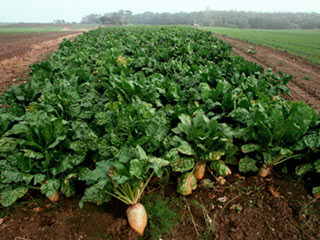USDA ignores court ruling, allows partial plantings of GM sugar beets
By Ken Roseboro
Published: March 1, 2011
Category: GM Food Labeling and Regulations

To access all the articles in this month's issue of The Organic & Non-GMO Report, SUBSCRIBE NOW.
Center for Food Safety challenges ruling; sugar beet groups file lawsuit, saying rules are too strict
One week after fully deregulating genetically modified alfalfa, the US Department of Agriculture’s Animal and Plant Health Inspection Service (APHIS) partially deregulated GM sugar beets, allowing restricted plantings—ignoring an earlier federal court ruling banning such plantings.
The “Roundup Ready” sugar beets are genetically engineered by Monsanto to tolerate applications of the company’s Roundup herbicide. According to USDA, 95% of sugar beets grown in the United States are Roundup Ready.
Decision challenged in court
The Center for Food Safety (CFS) immediately challenged USDA’s decision in court backed by a coalition of farmers and conservation groups: Organic Seed Alliance, High Mowing Organic Seeds, and the Sierra Club.
Last August, Judge Jeffrey White of the federal district court for the Northern District of California banned plantings of GM sugar beets because they are likely to cause irreparable harm to the organic seed company plaintiffs and the environment, and “may cross-pollinate with non-genetically engineered sugar beets and related Swiss chard and table beets.” Judge White ordered USDA to prepare an Environmental Impact Statement (EIS) before allowing the GM sugar beets to be grown.
APHIS has not yet completed the EIS, but decided to allow plantings anyway in defiance of the court ruling. The agency claims Roundup Ready sugar beets can be partially deregulated without having a significant effect on the environment.
Earthjustice attorney Paul Achitoff commented: “The lax conditions on growing the GM sugar beets in this approval are not materially different from those earlier rejected by the federal court as inadequate to protect other farmers, the public, and the environment. USDA has yet again violated the law requiring preparation of an EIS before unleashing this genetically engineered crop.”
“Direct affront to farmer and consumer choice”
The Organic Trade Association also blasted the approval. “Once again, USDA has plowed ahead on genetically engineered crops, this time to approve a petition for partial deregulation, even though the courts have found that APHIS failed to comply with National Environmental Policy Act mandates,” said Christine Bushway, executive director and CEO of the Organic Trade Association (OTA).
She added, “This direct affront to farmer and consumer choice flies in the face of USDA’s mandate and greatly jeopardizes agricultural diversity and the future of rural American livelihoods.”
On January 26, OTA joined other organic companies and groups in signing an amicus brief in the ongoing litigation to halt the continued planting of GM sugar beets. OTA was joined by the National Organic Coalition, National Cooperative Grocers Association, Organic Farming Research Foundation, Nature’s Path Foods, Inc., and United Natural Foods, Inc., among others.
USDA allowed seedlings to be planted
In addition, USDA authorized plantings of sugar beet seedlings called “stecklings” last September, also in defiance of the August court ruling. CFS and the groups again sued USDA. On November 30, 2010, the court granted the groups’ motion for a preliminary injunction and ordered the seed crop destroyed. Monsanto appealed that ruling and a hearing was held on February 15. A decision is expected soon after.
Pro-biotechnology groups were also unhappy with the USDA’s partial deregulation. The American Sugarbeet Growers Association and American Crystal Sugar Co. filed a lawsuit claiming that USDA’s partial deregulation puts too many restrictions on plantings of GM sugar beets. Farmers can’t plant another Roundup Ready sugar crop in the same land for four years and must establish a four-mile isolation distance between the crop and related vegetables such as Swiss chard and table beets.
© Copyright March 2011, The Organic & Non-GMO Report




